Remove Quick Flight Tracker browser hijacker
Browser HijackerAlso Known As: search.hquickflighttracker.com redirect
Get free scan and check if your device is infected.
Remove it nowTo use full-featured product, you have to purchase a license for Combo Cleaner. Seven days free trial available. Combo Cleaner is owned and operated by RCS LT, the parent company of PCRisk.com.
What is Quick Flight Tracker?
Quick Flight Tracker is a rogue application, endorsed as a tool pack, consisting of quick access to flight data and a web searcher. It can allegedly allow users to check live flight statuses and other related information from a browser's new tab/window and homepage, as well as generate enhanced search results.
Despite how useful this app appears, it is both a browser hijacker and a PUA (potentially unwanted application). Quick Flight Tracker modifies browsers to promote its fake search engine (search.hquickflighttracker.com), and it also spies on users browsing activity. Few users install this application intentionally, therefore it is classified as a PUA.
![]()
Browser hijackers are primarily designed for the most popular browsers - Google Chrome, Internet Explorer, Mozilla Firefox and others. These malignant apps operate by making changes to browser settings, such as: default search engine, homepage and new tab/window URL - in order to promote their fraudulent web searching tools.
In other words, every new tab//window opened and every search query typed into the URL bar - all redirect to a fake search engine. Quick Flight Tracker alters browsers to redirect to search.hquickflighttracker.com. However, this fake tool is unable to provide search results, therefore it redirects to search.yahoo.com - a legitimate search engine.
While these alterations are seemingly minor and easily reversible - that is not the case. Without removal of the hijacking app, access to browser settings can be limited and/or denied, and any changes made - automatically reset. Which makes using an afflicted browser an exercise in futility. It is also important to know, that most browser hijackers can track data.
By monitoring users browsing habits, they can find traces of their personal information. This vulnerable data is then sold to third parties (possibly, cyber criminals) and can end up being used for reprehensible purposes.
In summary PUAs present within a device can not only cause various browser and system invasions/infections, but also lead to serious privacy issues (even identity theft). If users suspect and/or detect dubious applications or browser extensions/plug-ins within their devices, they should remove such immediately.
| Name | Quick Flight Tracker |
| Threat Type | Browser Hijacker, Redirect, Search Hijacker, Toolbar, Unwanted New Tab |
| Detection Names | Avast (Win32:AdwareSig [Adw]), DrWeb (Adware.Spigot.145), ESET-NOD32 (A Variant Of Win32/WinWrapper.V Potentially Unwanted), Kaspersky (Not-a-virus:HEUR:AdWare.Win32.WebSearch.gen), Full List Of Detections (VirusTotal) |
| Browser Extension(s) | Flights, Quick Flight Tracker |
| Supposed Functionality | This app claims to help users easily find flight tickets and track flight statuses. |
| Promoted URL | search.hquickflighttracker.com |
| Serving IP Address (search.hquickflighttracker.com) | 35.168.163.146 |
| Affected Browser Settings | Homepage, new tab URL, default search engine |
| Symptoms | Manipulated Internet browser(s) settings (homepage, default Internet search engine, new tab settings). User's are forced to visit hijacker's website and search the Internet using their search engines. |
| Distribution methods | Deceptive pop-up ads, free software installers (bundling), fake flash player installers. |
| Damage | Internet browsing tracking (potential privacy issues), displaying of unwanted ads, redirects to shady websites. |
| Malware Removal (Windows) |
To eliminate possible malware infections, scan your computer with legitimate antivirus software. Our security researchers recommend using Combo Cleaner. Download Combo CleanerTo use full-featured product, you have to purchase a license for Combo Cleaner. 7 days free trial available. Combo Cleaner is owned and operated by RCS LT, the parent company of PCRisk.com. |
There are thousands of browser hijackers out there. Most are relatively similar, some even identical. Relevant examples to Quick Flight Tracker include: Transit Schedules, Track Your Transit Info, Directions And Maps Plus, Earth & Satellite View and many others.
To create the appearance of legitimacy, nearly all PUAs offer certain features to tempt users into installing them. While these features vary greatly and frequently sound very useful and beneficial; they are more likely to be absolutely nonfunctional.
Unwanted apps are not designed for the purposes they advertise, they have just one goal - to generate revenue for their developers. PUAs hijack browsers, cause redirects to sale-based, untrustworthy and malicious websites, as well as deliver intrusive advertisement campaigns (pop-ups, banners, coupons, surveys, etc.) and they track sensitive information.
How did Quick Flight Tracker install on my computer?
Intrusive advertisements are known to be PUA proliferators. Usually located in compromised sites, these ads look utterly ordinary and harmless, but once clicked they make stealthy downloads/installs of undesirable content.
Unwanted applications can also be downloaded/installed by users themselves, either from "official" promotional webpages or alongside other desired software. The false marketing method of pre-packing regular programs with PUAs, is called "bundling". Bundled software is rife in untrustworthy download sources.
The risk of PUA invasions grows when users have an inattentive and hasty approach towards download/installation processes (e.g. ignoring terms, skipping steps, using pre-set options and similar).
How to avoid installation of potentially unwanted applications?
Only trustworthy and verified download sources should be used, as opposed to peer-to-peer sharing networks (e.g. BitTorrent, Gnutella, eMule, etc.) and other third party downloaders. It is advised to read download/installation terms, to check whether there is no foul play involved.
When installing, users should explore all possible options, use "Custom/Advanced" settings and opt-out from installing additional apps/features and/or decline downloading such from elsewhere. Prudent browsing is encouraged; that includes avoiding suspicious websites and being wary of clicking on random advertisements.
In case users encounter questionable ads and rogue redirects, they are advised to perform a system check and remove all dubious applications and/or browser extensions found. If your computer is already infected with Quick Flight Tracker, we recommend running a scan with Combo Cleaner Antivirus for Windows to automatically eliminate this browser hijacker.
Quick Flight Tracker browser hijacker installer set-up:
![]()
Website promoting Quick Flight Tracker browser hijacker:
![]()
Instant automatic malware removal:
Manual threat removal might be a lengthy and complicated process that requires advanced IT skills. Combo Cleaner is a professional automatic malware removal tool that is recommended to get rid of malware. Download it by clicking the button below:
DOWNLOAD Combo CleanerBy downloading any software listed on this website you agree to our Privacy Policy and Terms of Use. To use full-featured product, you have to purchase a license for Combo Cleaner. 7 days free trial available. Combo Cleaner is owned and operated by RCS LT, the parent company of PCRisk.com.
Quick menu:
- What is Quick Flight Tracker?
- STEP 1. Uninstall Quick Flight Tracker application using Control Panel.
- STEP 2. Remove search.hquickflighttracker.com redirect from Internet Explorer.
- STEP 3. Remove Quick Flight Tracker browser hijacker from Google Chrome.
- STEP 4. Remove search.hquickflighttracker.com homepage and default search engine from Mozilla Firefox.
- STEP 5. Remove search.hquickflighttracker.com redirect from Safari.
- STEP 6. Remove rogue plug-ins from Microsoft Edge.
Quick Flight Tracker browser hijacker removal:
Windows 11 users:
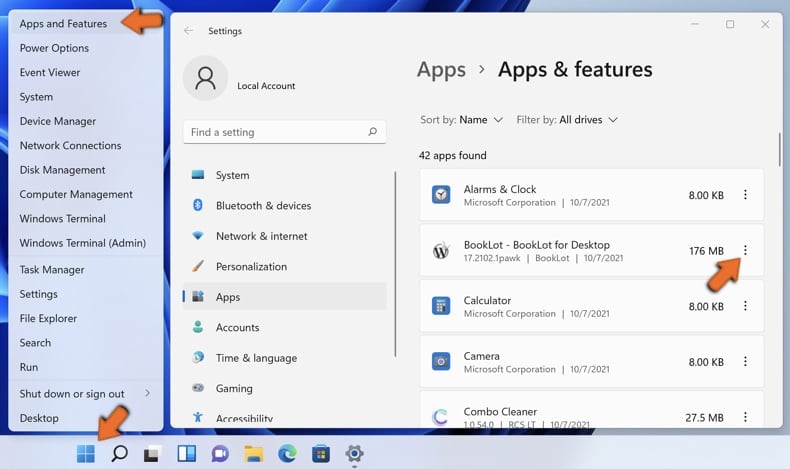
Right-click on the Start icon, select Apps and Features. In the opened window search for the application you want to uninstall, after locating it, click on the three vertical dots and select Uninstall.
Windows 10 users:
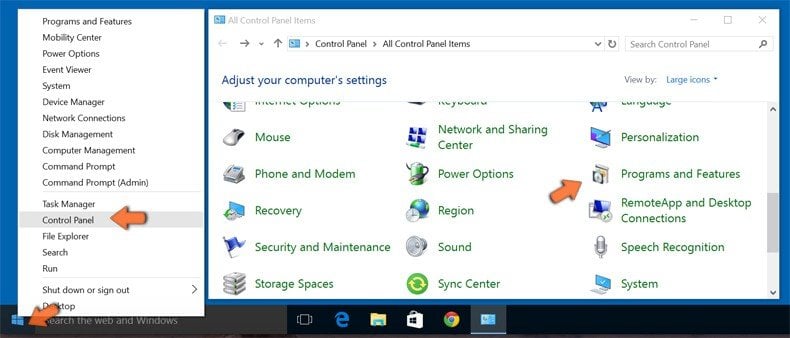
Right-click in the lower left corner of the screen, in the Quick Access Menu select Control Panel. In the opened window choose Programs and Features.
Windows 7 users:
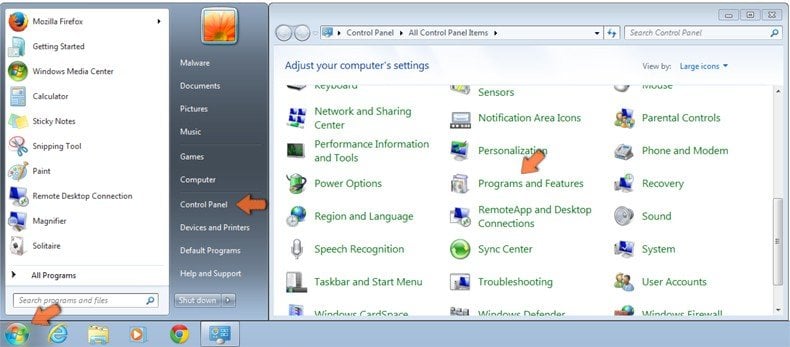
Click Start (Windows Logo at the bottom left corner of your desktop), choose Control Panel. Locate Programs and click Uninstall a program.
macOS (OSX) users:
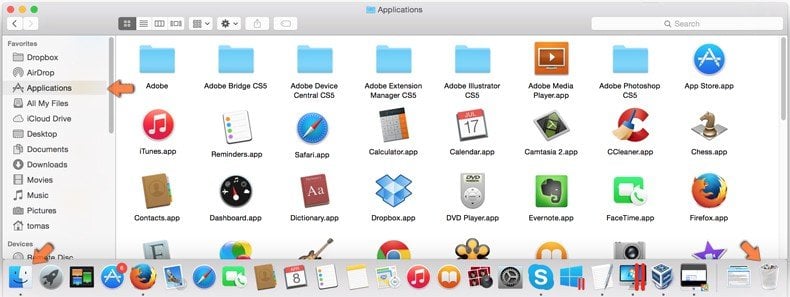
Click Finder, in the opened screen select Applications. Drag the app from the Applications folder to the Trash (located in your Dock), then right click the Trash icon and select Empty Trash.
![]()
In the uninstall programs window: look for any recently installed suspicious applications (for example, "Quick Flight Tracker"), select these entries and click "Uninstall" or "Remove".
After uninstalling the potentially unwanted applications (which cause browser redirects to the search.hquickflighttracker.com website), scan your computer for any remaining unwanted components. To scan your computer, use recommended malware removal software.
DOWNLOAD remover for malware infections
Combo Cleaner checks if your computer is infected with malware. To use full-featured product, you have to purchase a license for Combo Cleaner. 7 days free trial available. Combo Cleaner is owned and operated by RCS LT, the parent company of PCRisk.com.
Quick Flight Tracker browser hijacker removal from Internet browsers:
Video showing how to remove browser redirects:
 Remove malicious add-ons from Internet Explorer:
Remove malicious add-ons from Internet Explorer:
![]()
Click the "gear" icon ![]() (at the top right corner of Internet Explorer), select "Manage Add-ons". Look for any recently installed suspicious extensions, select these entries and click "Remove".
(at the top right corner of Internet Explorer), select "Manage Add-ons". Look for any recently installed suspicious extensions, select these entries and click "Remove".
Change your homepage:
![]()
Click the "gear" icon ![]() (at the top right corner of Internet Explorer), select "Internet Options", in the opened window remove hxxp://search.hquickflighttracker.com and enter your preferred domain, which will open each time you launch Internet Explorer. You can also enter about: blank to open a blank page when you start Internet Explorer.
(at the top right corner of Internet Explorer), select "Internet Options", in the opened window remove hxxp://search.hquickflighttracker.com and enter your preferred domain, which will open each time you launch Internet Explorer. You can also enter about: blank to open a blank page when you start Internet Explorer.
Change your default search engine:
![]()
Click the "gear" icon ![]() (at the top right corner of Internet Explorer), select "Manage Add-ons". In the opened window, select "Search Providers", set "Google", "Bing", or any other preferred search engine as your default and then remove "Quick Flight Tracker".
(at the top right corner of Internet Explorer), select "Manage Add-ons". In the opened window, select "Search Providers", set "Google", "Bing", or any other preferred search engine as your default and then remove "Quick Flight Tracker".
Optional method:
If you continue to have problems with removal of the search.hquickflighttracker.com redirect, reset your Internet Explorer settings to default.
Windows XP users: Click Start, click Run, in the opened window type inetcpl.cpl In the opened window click the Advanced tab, then click Reset.

Windows Vista and Windows 7 users: Click the Windows logo, in the start search box type inetcpl.cpl and click enter. In the opened window click the Advanced tab, then click Reset.
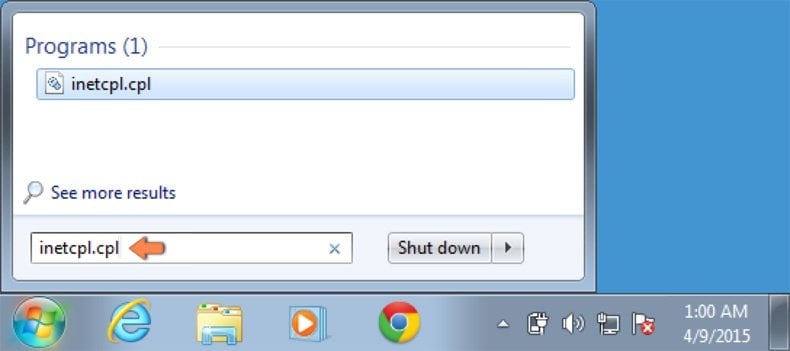
Windows 8 users: Open Internet Explorer and click the gear icon. Select Internet Options.
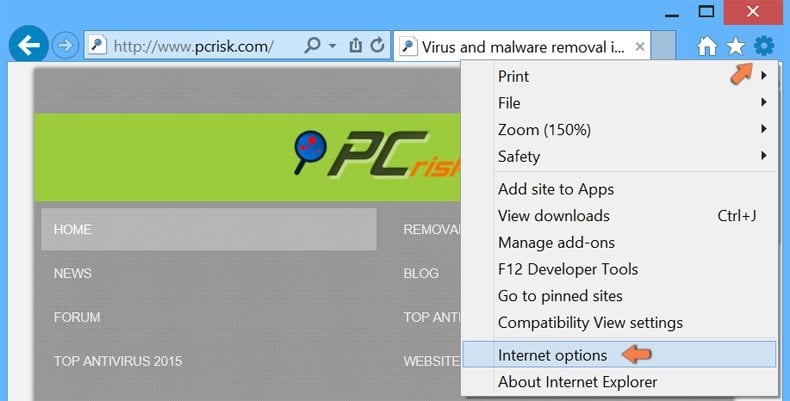
In the opened window, select the Advanced tab.
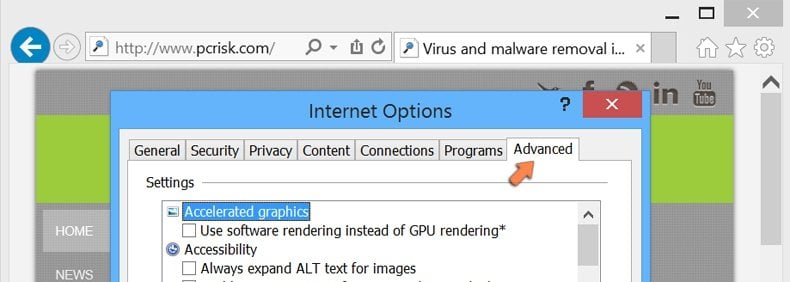
Click the Reset button.

Confirm that you wish to reset Internet Explorer settings to default by clicking the Reset button.
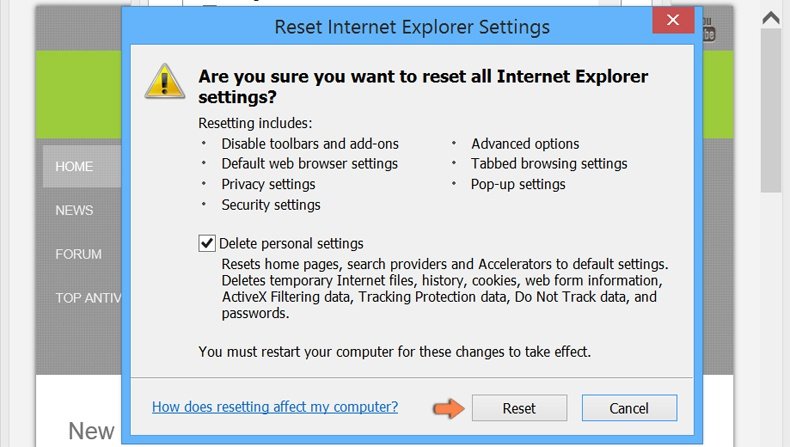
 Remove malicious extensions from Google Chrome:
Remove malicious extensions from Google Chrome:
![]()
Click the Chrome menu icon ![]() (at the top right corner of Google Chrome), select "More tools" and click "Extensions". Locate "Quick Flight Tracker" and other recently-installed suspicious browser add-ons, and remove them.
(at the top right corner of Google Chrome), select "More tools" and click "Extensions". Locate "Quick Flight Tracker" and other recently-installed suspicious browser add-ons, and remove them.
Change your homepage:
![]()
Click the Chrome menu icon ![]() (at the top right corner of Google Chrome), select "Settings". In the "On startup" section, disable "Quick Flight Tracker", look for a browser hijacker URL (hxxp://www.search.hquickflighttracker.com) below the “Open a specific or set of pages” option. If present click on the three vertical dots icon and select “Remove”.
(at the top right corner of Google Chrome), select "Settings". In the "On startup" section, disable "Quick Flight Tracker", look for a browser hijacker URL (hxxp://www.search.hquickflighttracker.com) below the “Open a specific or set of pages” option. If present click on the three vertical dots icon and select “Remove”.
Change your default search engine:
![]()
To change your default search engine in Google Chrome: Click the Chrome menu icon ![]() (at the top right corner of Google Chrome), select "Settings", in the "Search engine" section, click "Manage search engines...", in the opened list look for "search.hquickflighttracker.com", when located click the three vertical dots near this URL and select "Remove from list".
(at the top right corner of Google Chrome), select "Settings", in the "Search engine" section, click "Manage search engines...", in the opened list look for "search.hquickflighttracker.com", when located click the three vertical dots near this URL and select "Remove from list".
Optional method:
If you continue to have problems with removal of the search.hquickflighttracker.com redirect, reset your Google Chrome browser settings. Click the Chrome menu icon ![]() (at the top right corner of Google Chrome) and select Settings. Scroll down to the bottom of the screen. Click the Advanced… link.
(at the top right corner of Google Chrome) and select Settings. Scroll down to the bottom of the screen. Click the Advanced… link.
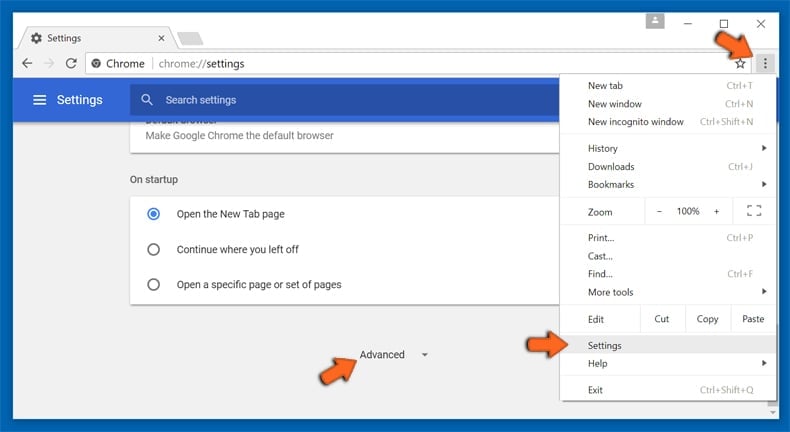
After scrolling to the bottom of the screen, click the Reset (Restore settings to their original defaults) button.
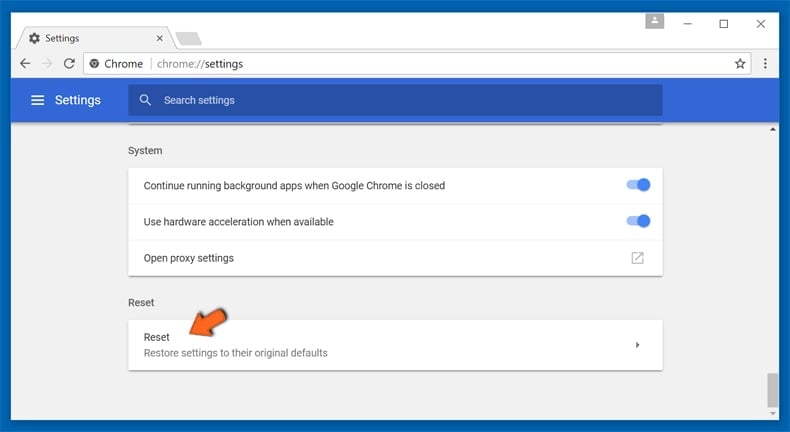
In the opened window, confirm that you wish to reset Google Chrome settings to default by clicking the Reset button.
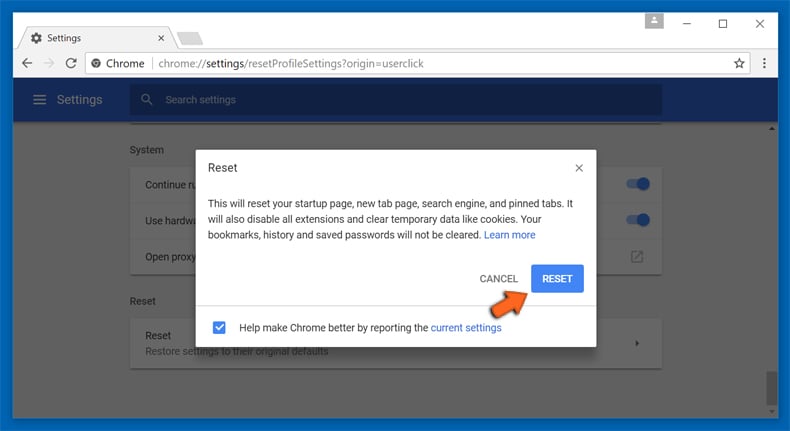
 Remove malicious plugins from Mozilla Firefox:
Remove malicious plugins from Mozilla Firefox:
![]()
Click the Firefox menu ![]() (at the top right corner of the main window), select "Add-ons". Click on "Extensions" and remove "Quick Flight Tracker" (or simply "Flights"), as well as all other recently installed browser plug-ins.
(at the top right corner of the main window), select "Add-ons". Click on "Extensions" and remove "Quick Flight Tracker" (or simply "Flights"), as well as all other recently installed browser plug-ins.
Change your homepage:
![]()
To reset your homepage, click the Firefox menu ![]() (at the top right corner of the main window), then select "Options", in the opened window disable "Quick Flight Tracker" (or simply "Flights"), remove hxxp://search.hquickflighttracker.com and enter your preferred domain, which will open each time you start Mozilla Firefox.
(at the top right corner of the main window), then select "Options", in the opened window disable "Quick Flight Tracker" (or simply "Flights"), remove hxxp://search.hquickflighttracker.com and enter your preferred domain, which will open each time you start Mozilla Firefox.
Change your default search engine:
![]()
In the URL address bar, type about:config and press Enter.
Click "I'll be careful, I promise!".
In the search filter at the top, type: "moz-extension"
Right-click on the found preferences and select "Reset" to restore default values.
Optional method:
Computer users who have problems with search.hquickflighttracker.com redirect removal can reset their Mozilla Firefox settings.
Open Mozilla Firefox, at the top right corner of the main window, click the Firefox menu, ![]() in the opened menu, click Help.
in the opened menu, click Help.
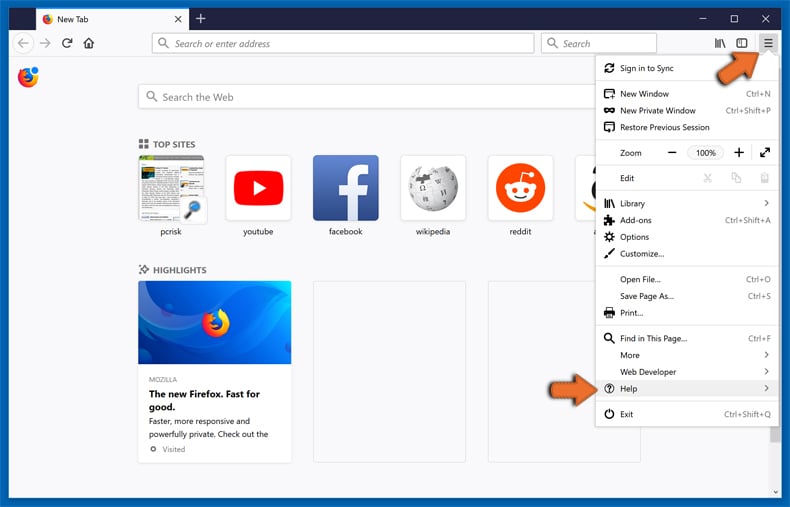
Select Troubleshooting Information.
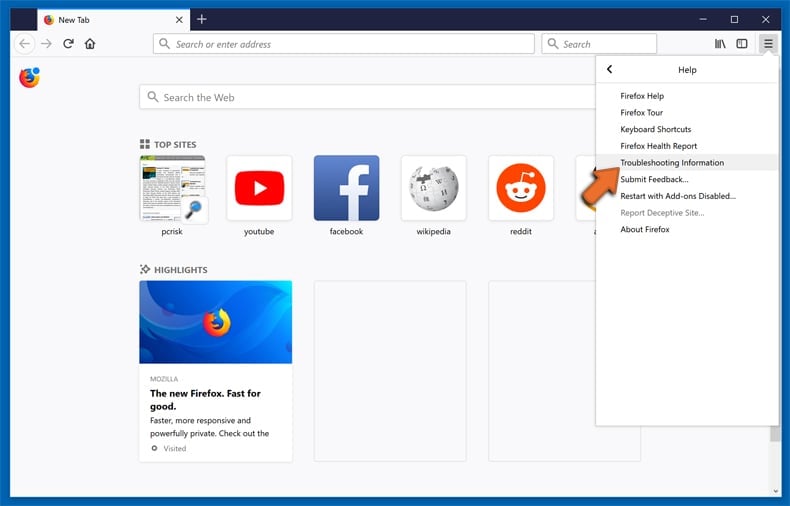
In the opened window, click the Refresh Firefox button.
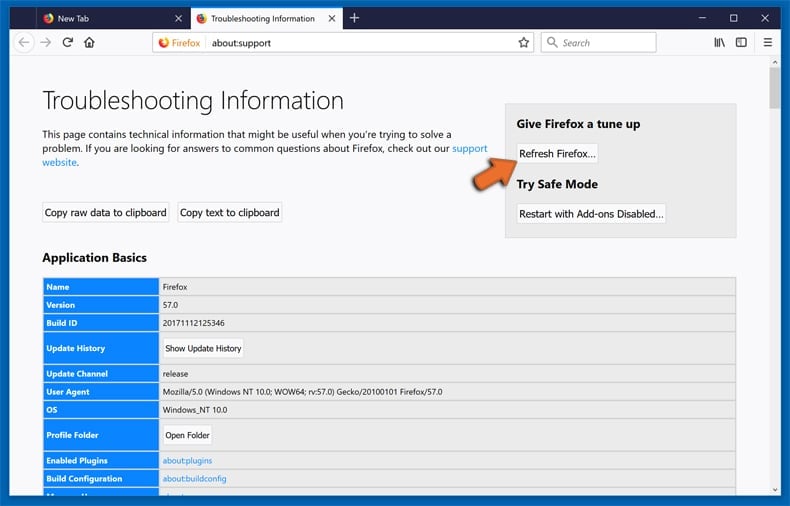
In the opened window, confirm that you wish to reset Mozilla Firefox settings to default by clicking the Refresh Firefox button.
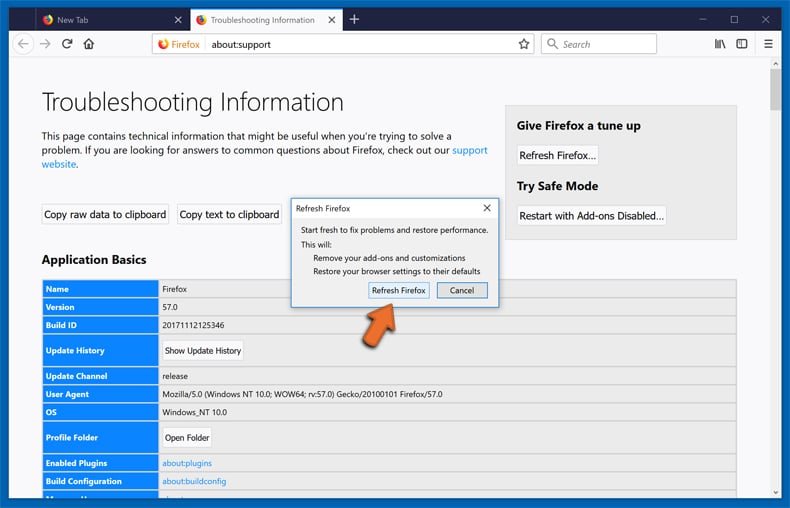
 Remove malicious extensions from Safari:
Remove malicious extensions from Safari:
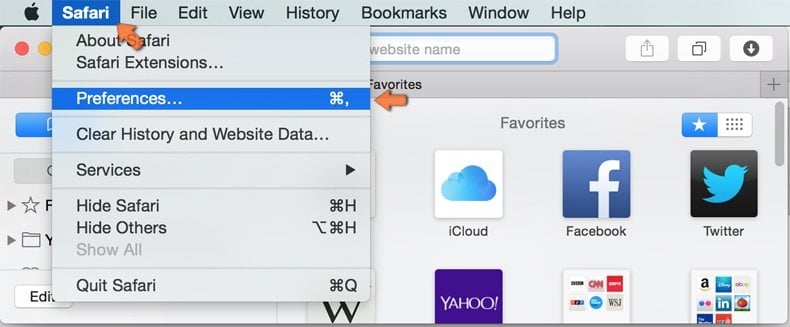
Make sure your Safari browser is active and click Safari menu, then select Preferences...
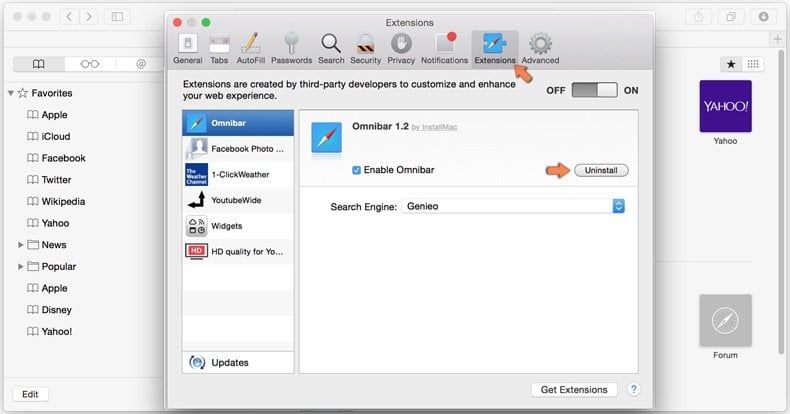
In the preferences window select the Extensions tab. Look for any recently installed suspicious extensions and uninstall them.
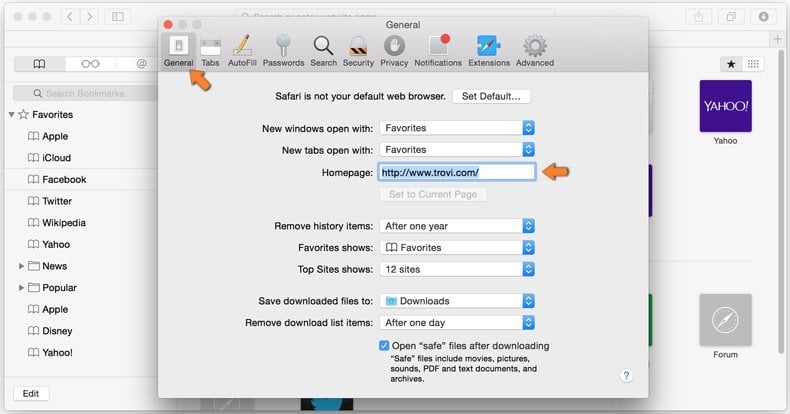
In the preferences window select General tab and make sure that your homepage is set to a preferred URL, if its altered by a browser hijacker - change it.
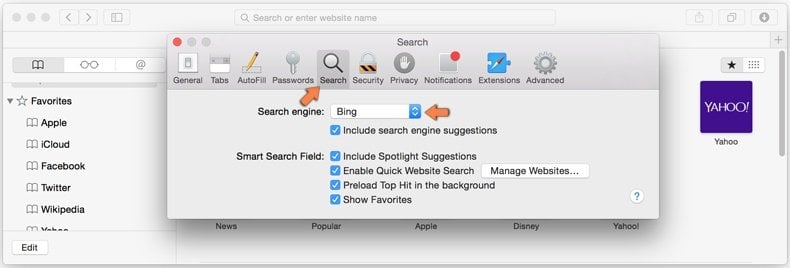
In the preferences window select Search tab and make sure that your preferred Internet search engine is selected.
Optional method:
Make sure your Safari browser is active and click on Safari menu. From the drop down menu select Clear History and Website Data...
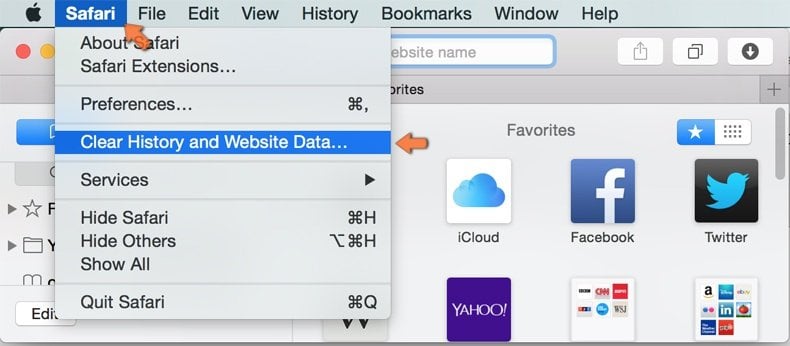
In the opened window select all history and click the Clear History button.
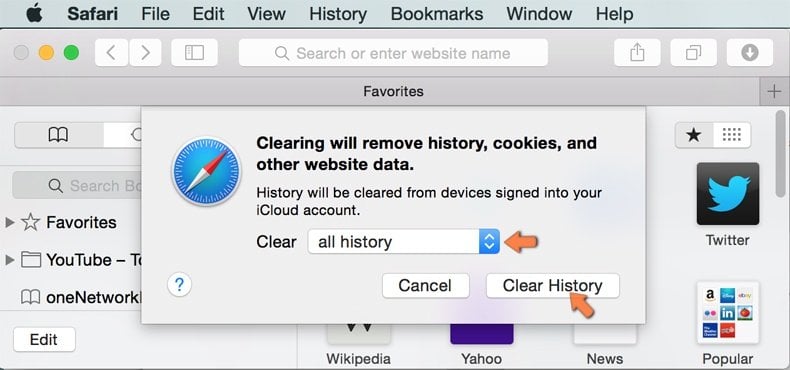
 Remove malicious extensions from Microsoft Edge:
Remove malicious extensions from Microsoft Edge:
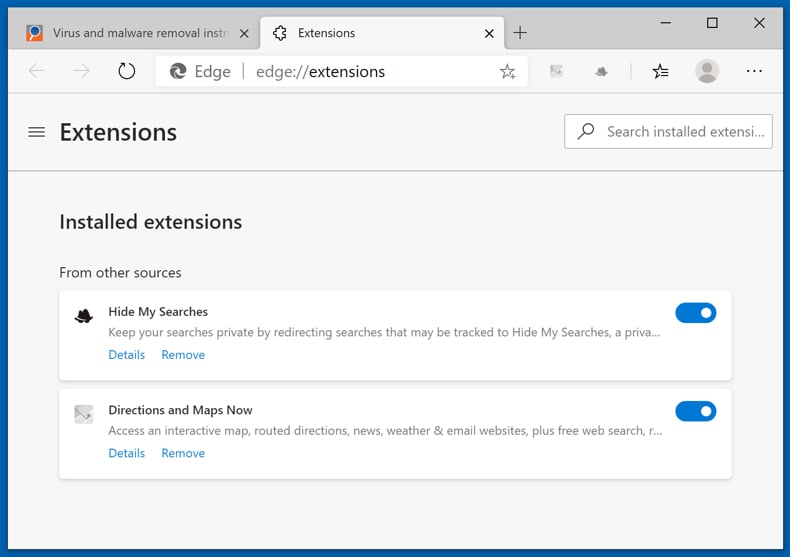
Click the Edge menu icon ![]() (at the top right corner of Microsoft Edge), select "Extensions". Locate any recently-installed suspicious browser add-ons, and remove them.
(at the top right corner of Microsoft Edge), select "Extensions". Locate any recently-installed suspicious browser add-ons, and remove them.
Change your homepage and new tab settings:
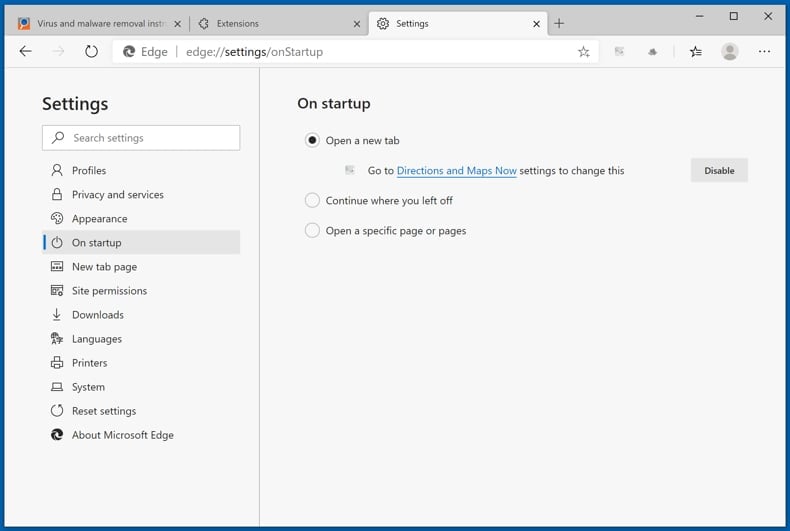
Click the Edge menu icon ![]() (at the top right corner of Microsoft Edge), select "Settings". In the "On startup" section look for the name of the browser hijacker and click "Disable".
(at the top right corner of Microsoft Edge), select "Settings". In the "On startup" section look for the name of the browser hijacker and click "Disable".
Change your default Internet search engine:
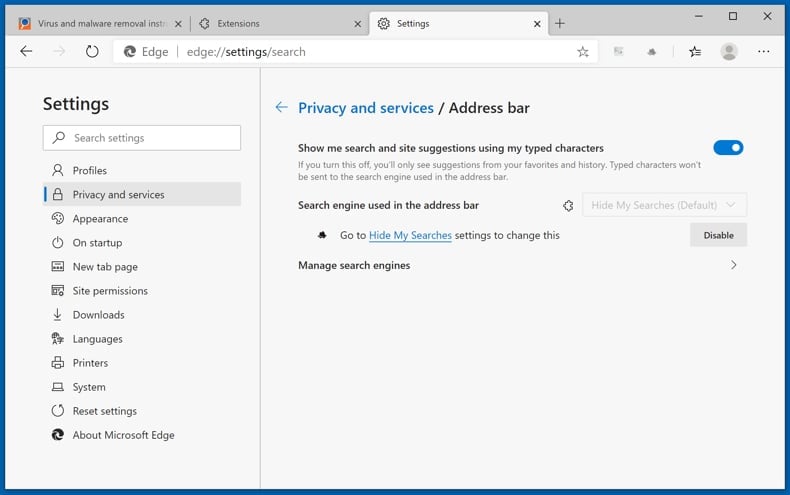
To change your default search engine in Microsoft Edge: Click the Edge menu icon ![]() (at the top right corner of Microsoft Edge), select "Privacy and services", scroll to bottom of the page and select "Address bar". In the "Search engines used in address bar" section look for the name of the unwanted Internet search engine, when located click the "Disable" button near it. Alternatively you can click on "Manage search engines", in the opened menu look for unwanted Internet search engine. Click on the puzzle icon
(at the top right corner of Microsoft Edge), select "Privacy and services", scroll to bottom of the page and select "Address bar". In the "Search engines used in address bar" section look for the name of the unwanted Internet search engine, when located click the "Disable" button near it. Alternatively you can click on "Manage search engines", in the opened menu look for unwanted Internet search engine. Click on the puzzle icon ![]() near it and select "Disable".
near it and select "Disable".
Optional method:
If you continue to have problems with removal of the search.hquickflighttracker.com redirect, reset your Microsoft Edge browser settings. Click the Edge menu icon ![]() (at the top right corner of Microsoft Edge) and select Settings.
(at the top right corner of Microsoft Edge) and select Settings.
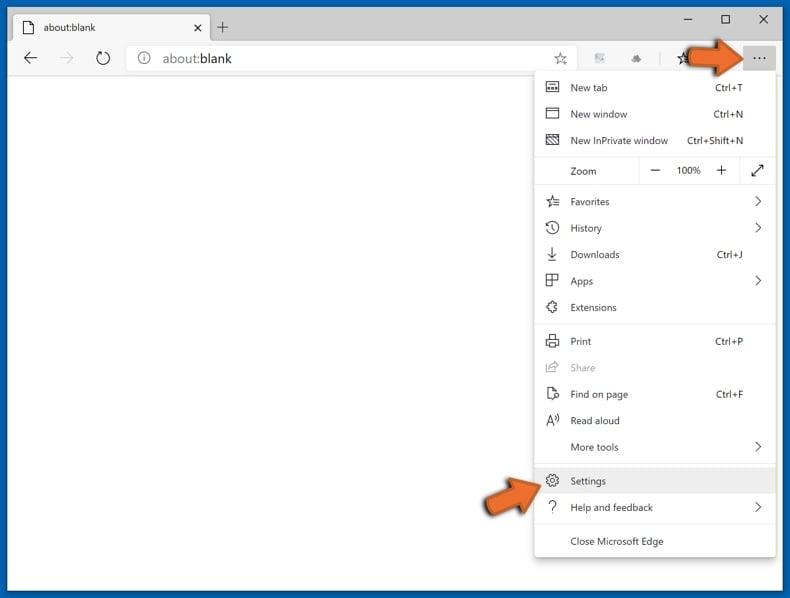
In the opened settings menu select Reset settings.
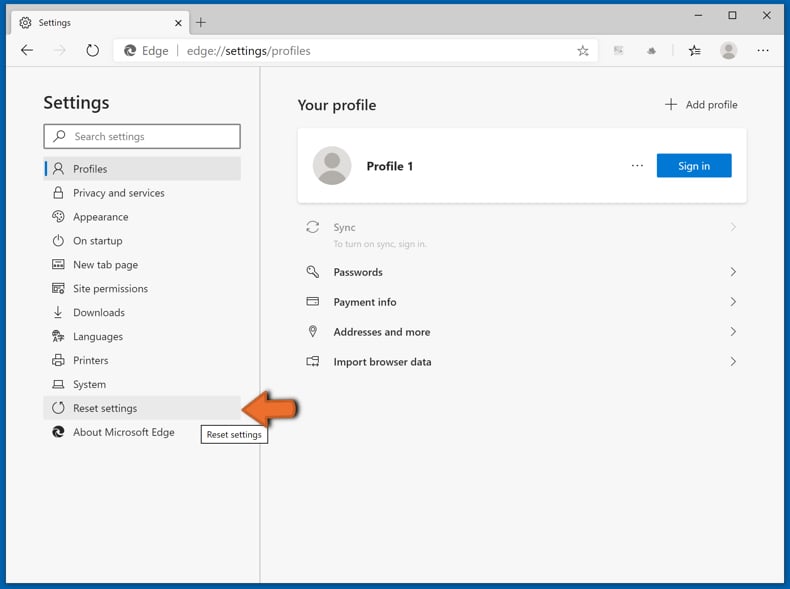
Select Restore settings to their default values. In the opened window, confirm that you wish to reset Microsoft Edge settings to default by clicking the Reset button.
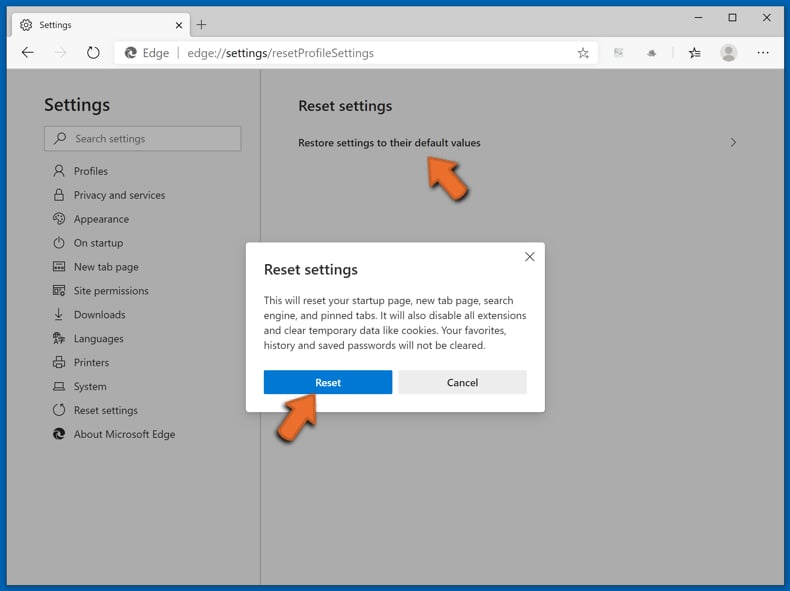
- If this did not help, follow these alternative instructions explaining how to reset the Microsoft Edge browser.
Summary:
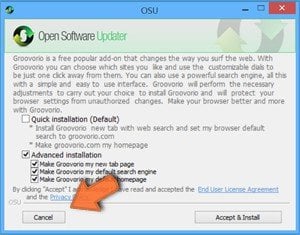 A browser hijacker is a type of adware infection that modifies Internet browser settings by assigning the homepage and default Internet search engine settings to some other (unwanted) website URL. Commonly, this type of adware infiltrates operating systems through free software downloads. If your download is managed by a download client, ensure that you decline offers to install advertised toolbars or applications that seek to change your homepage and default Internet search engine settings.
A browser hijacker is a type of adware infection that modifies Internet browser settings by assigning the homepage and default Internet search engine settings to some other (unwanted) website URL. Commonly, this type of adware infiltrates operating systems through free software downloads. If your download is managed by a download client, ensure that you decline offers to install advertised toolbars or applications that seek to change your homepage and default Internet search engine settings.
Post a comment:
If you have additional information on search.hquickflighttracker.com redirect or it's removal please share your knowledge in the comments section below.
Share:

Tomas Meskauskas
Expert security researcher, professional malware analyst
I am passionate about computer security and technology. I have an experience of over 10 years working in various companies related to computer technical issue solving and Internet security. I have been working as an author and editor for pcrisk.com since 2010. Follow me on Twitter and LinkedIn to stay informed about the latest online security threats.
PCrisk security portal is brought by a company RCS LT.
Joined forces of security researchers help educate computer users about the latest online security threats. More information about the company RCS LT.
Our malware removal guides are free. However, if you want to support us you can send us a donation.
DonatePCrisk security portal is brought by a company RCS LT.
Joined forces of security researchers help educate computer users about the latest online security threats. More information about the company RCS LT.
Our malware removal guides are free. However, if you want to support us you can send us a donation.
Donate
▼ Show Discussion